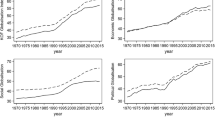Abstract
The constraints of demographic trends, particularly population growth rates, on participation in the Kyoto Protocol have not been taken into account by previous researchers. Here I assess the effect of projected population growth on (1) the degree of restrictions in carbon dioxide emissions nations negotiated during the development of the Protocol, and (2) whether or not nations ultimately ratified the Protocol. The results indicate that nations with higher expected population growth rates negotiated higher carbon targets than other nations and were ultimately less likely to ratify the Protocol.
Similar content being viewed by others
References
C. Azar S.H. Schneider (2002) ArticleTitleAre the economic costs of stabilizing the atmosphere prohibitive? Ecological Economics 42 73–80 Occurrence Handle10.1016/S0921-8009(02)00042-3
K.A. Bollen (1989) Structural equations with latent variables John Wiley & Sons New York
S. Chatterjee A.S. Hadi B. Price (2000) Regression analysis by example EditionNumber3 John Wiley & Sons New York
M.G.J. Elzen Particleden A.P.G. Moor Particlede (2002) ArticleTitleAnalyzing the Kyoto Protocol under the Marrakesh Accords: Economic efficiency and environmental effectiveness Ecological Economics 43 141–158
T. Dietz R.S. Frey L. Kalof (1987) ArticleTitleEstimation with cross national data: Robust and nonparametric methods American Sociological Review 52 380–290
T. Dietz L. Kalof R.S. Frey (1991) ArticleTitleOn the utility of robust and resampling procedures Rural Sociology 56 IssueID3 461–474
T. Dietz E.A. Rosa (1997) ArticleTitleEffects of population and affluence on CO2 emissions Proceedings of the National Academy of Sciences of the USA 94 175–179 Occurrence Handle10.1073/pnas.94.1.175
D.R. Fisher (2003) ArticleTitleGlobal and domestic actors within the global climate change regime: Toward a theory of global environmental systems International Journal of Sociology and Social Policy 23 IssueID10 5–30
J.B. Foster (2004) ArticleTitleThe Pentagon and climate change Monthly Review 56 IssueID1 1–13
J.B. Foster B. Clark (2003) Ecological imperialism: The curse of capitalism L. Panitch C. Leys (Eds) Socialist register 2004: The new imperial challenge Merlin Press London 186–201
InstitutionalAuthorNameIPCC [Inter-governmental Panel on Climate change] (2001) Climate change 2001: The scientific basis Cambridge University Press Cambridge, England
T.R. Karl K.E. Trenberth (2003) ArticleTitleModern global climate change Science 302 1719–1723 Occurrence Handle10.1126/science.1090228
N. Khanna (2001) ArticleTitleAnalyzing the economic cost of the Kyoto protocol Ecological Economics 38 59–69 Occurrence Handle10.1016/S0921-8009(00)00295-0
J.S. Long (1997) Regression models for categorical and limited dependent variables Sage London
W. Lutz B.C. O’Neill S. Scherbov (2003) ArticleTitleEurope’s population at a turning point Science 299 1991–1992 Occurrence Handle10.1126/science.1080316
A.M. McCright R.E. Dunlap (2003) ArticleTitleDefeating Kyoto: The conservative movement’s impact on US climate change policy Social Problems 50 IssueID3 348–373 Occurrence Handle10.1525/sp.2003.50.3.348
S.P. Morgan (2003) ArticleTitleIs low fertility a twenty-first century demographic crisis? Demography 40 IssueID4 589–603
A.R. Pebley (1998) ArticleTitleDemography and the environment Demography 35 IssueID4 377–389
Roberts, J.T. & Vásquez, A.A. (2002), State environmentalism revisited: Structural predictors of nations’ propensity to sign environmental treaties or who signs environmental treaties and why? A world-system analysis. Paper presented at the International Studies Association conference, New Orleans, March 14th.
A. Shi (2003) ArticleTitleThe impact of population pressure on global carbon dioxide emissions, 1975–1996: Evidence from pooled cross-country data Ecological Economics 44 29–42 Occurrence Handle10.1016/S0921-8009(02)00223-9
United Nations Framework Convention on Climate Change (UNFCCC). (2004), http://unfccc.int/resource/convkp.html. Website last accessed June 8th.
InstitutionalAuthorNameWorld Bank. (2002) World development indicators 2002 World Bank Washington DC
InstitutionalAuthorNameWorld Resources Institute, United Nations Environment Programme, United Nations Development Programme, & World Bank (2003) World resources 2002–2004: Decisions for the Earth: Balance, voice, and power World Resources Institute Washington DC
R. York E.A. Rosa T. Dietz (2003a) ArticleTitleSTIRPAT, IPAT, and ImPACT: Analytic tools for unpacking the driving forces of environmental impacts Ecological Economics 46 IssueID3 351–365 Occurrence Handle10.1016/S0921-8009(03)00188-5
R. York E.A. Rosa T. Dietz (2003b) ArticleTitleA rift in modernity? Assessing the anthropogenic sources of global climate change with the STIRPAT model International Journal of Sociology and Social Policy 23 IssueID10 31–51
Author information
Authors and Affiliations
Corresponding author
Rights and permissions
About this article
Cite this article
York, R. Kyoto Protocol Participation: A Demographic Explanation. Popul Res Policy Rev 24, 513–526 (2005). https://doi.org/10.1007/s11113-005-1291-x
Issue Date:
DOI: https://doi.org/10.1007/s11113-005-1291-x




